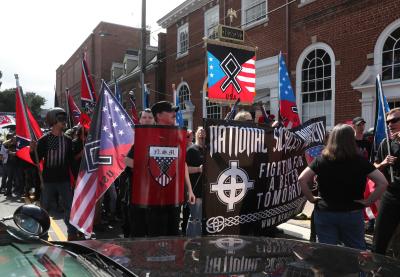In the past year, hate has become an American hallmark, visible and almost commonplace in every sector of American life, including in educational spaces. Neo-Nazis, members of the so-called “alt-right,” and other kinds of closely related bullies are increasingly vocal, and swastikas are no longer only visible in history books. There is little in formal teacher education that could have prepared educators for this onslaught of public hate, although anti-racist resources do exist.
Educators, school psychologists, social workers and other experts have responded by generating tools that focus specifically on hate symbols, that broadly address the idea of safe schools, that describe methods of social justice teaching and address other forms of hate (such as hate against LGBT children and youth). They've developed resources that cover immigration issues and re-educate teachers about the history of oppression and racism in the United States. Teaching Tolerance has provided invaluable tools for assessing and addressing hate in schools; here we add to that toolkit a story about how we aligned with our students to respond to a neo-Nazi rally on our campus.
What happened at our school, the University of North Florida (UNF), has become woefully more common within and beyond educational settings. As professors, we were aware of this trend, but still unprepared when a one-time Grand Dragon of the KKK—now a member of the National Socialist Movement, one of the largest U.S. neo-Nazi organizations—revealed that he was a student at our school. We were even less prepared when he shared on social media a photograph of himself, shirtless with swastika tattoos, holding an automatic weapon and urging students in specific anti-racist organizations to “come at [him].”
UNF made national headlines for temporarily suspending this student for threatening his peers. But while administrators met with legal teams to determine if the suspension was justified, members of a hate group began planning an event to support white nationalism on our campus.
Like other communities, our school—and Jacksonville more broadly—was divided in its response to the neo-Nazi protest and the anti-racist counter-protest. Some students echoed an increasingly common disdain for counter-protesting; others responded with understandable anger or fear. We professors quickly learned the difficulties of supporting the anti-racist community while also protecting the First Amendment rights of students—even those with racist ideologies.
Almost immediately, Students for a Democratic Society and other student and community organizations began developing a joint response. They demanded accountability, and they used social media to organize a “No Nazis at UNF” counter-protest.
While we supported the activism of these students, we didn’t want to insert ourselves—and our authority—into the student-led, anti-racist protest. Instead, we chose to stand firm against hate in a different way. We decided that the best response to dealing with neo-Nazis (particularly those who post selfies with weapons designed to intimidate us) was to not stir up more hate. Inspired by the residents of Wunsiedel, Germany, we decided to host our own “Nazis against Nazis” march as a playful way of promoting anti-racism.
Our emphasis on play does not imply that we took the issue lightly; rather, like the riddikulus spell from Harry Potter, we undermined the power of white supremacists on our campus by crafting a response that did not feed hate or anger but instead played the hate against the orchestrators of it.
In our private time, we solicited sponsors for what we called the “Involuntary Charity Walk.” Donors pledged to donate $5 (or any amount they could afford) for each neo-Nazi who showed up at the planned rally. The money went to local and national anti-racist causes, organizations ranging from our Black Student Union and LGBTQ Center to the NAACP. Within 24 hours, we had over $1,000 in pledges to support anti-racist work. By the end of the week, we’d raised nearly $1,700.
Interestingly, there was no institutional response to the student counter-protest or our fundraiser. This type of selective silence is not uncommon, as leaders of primary and secondary educational institutions walk gently around the edges of student activism hoping perhaps that these disruptions will go away quietly.
In the past few years, however, we have seen just how powerful student voices can be. Black teens have long led the fight for gun reform; more recently, students from Marjory Stoneman Douglas High School have joined and amplified this national conversation. But our method offers a model for supporting young people in their protests without co-opting their activism.
On the day of the march, we arrived to find much of the road blocked off and a heavy security presence. We took our signs informing the white supremacists of their success as anti-racist fundraisers and waited with a small crowd. Then we heard singing. The students who organized the anti-racist protest arrived, singing civil rights songs as they marched.
In all, four white supremacists showed up in support of our neo-Nazi student. They were met by more than a hundred people: around 80 students, a dozen speakers from local anti-racist organizations, 15 concerned citizens, and a community of silent donors who (named or unnamed) had rallied, too, and had generously supported our fundraiser.
Educators can suggest our strategy to students looking for a constructive way to respond to hate, or they can add this action to a student-led event to show their support as allies. It offers a way to involve younger students, providing opportunities to collaborate with them on anti-racist work without worrying about exposing them to danger. It supports anti-racist organizations, it builds relationships and it lets students take charge as they push back against hate within their own community.
Lieberman is Assistant Professor of English at the University of North Florida, and has taught classes to conventional and incarcerated students in subjects ranging from American literature and African-American literature to gender and women studies and the history of science, medicine and technology.
Ali-Khan is Associate Professor of Education at the University of North Florida. Her teaching and research focus on social justice in educational spaces.


0 COMMENTS